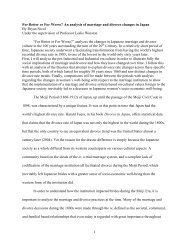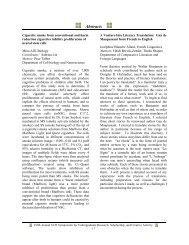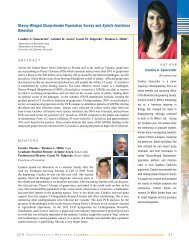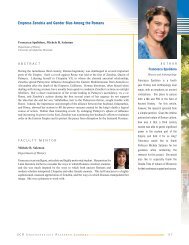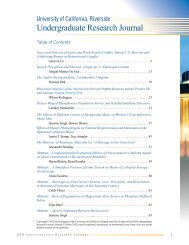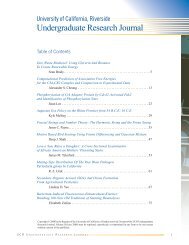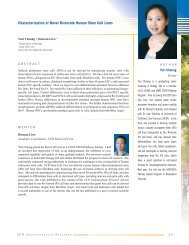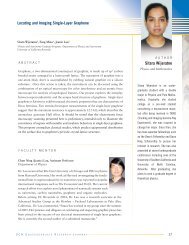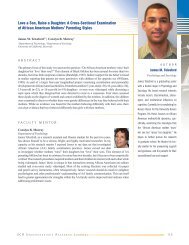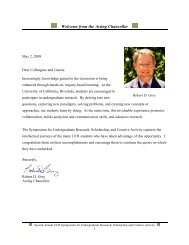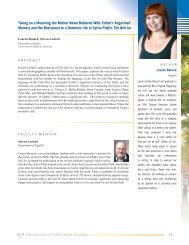2010 - Undergraduate Research, Scholarship and Creative Activity
2010 - Undergraduate Research, Scholarship and Creative Activity
2010 - Undergraduate Research, Scholarship and Creative Activity
Create successful ePaper yourself
Turn your PDF publications into a flip-book with our unique Google optimized e-Paper software.
conformity on violence against women through<br />
social services <strong>and</strong> the language of law. I argue<br />
for different coalition strategies among women<br />
to rid their services of language that is<br />
sometimes raced, gendered <strong>and</strong> hence exclusive<br />
of some women in the fight against violence<br />
against women.<br />
Ethics: The Impossible Luxury<br />
Jesse Driebusch, <strong>Creative</strong> Writing<br />
Mentor: Michael Jayme<br />
Department of <strong>Creative</strong> Writing<br />
My project is a series of three fiction short<br />
stories. For the first, sexuality is the theme.<br />
Three middle-aged men go fishing at a<br />
remote desert lake. Berry is married but has<br />
a crush on Dale. Hugh is also married <strong>and</strong> is<br />
having an affair with a minor. Dale isn‘t<br />
married, albeit the only true heterosexual.<br />
The trio is altogether self-absorbed <strong>and</strong><br />
oblivious to one another‘s emotional<br />
st<strong>and</strong>points. The second, individual-ism is the<br />
theme. This story centers around a mid-twenties<br />
male, residing in the Bay Area, who attempts to<br />
redefine his humble past by weaving a<br />
sophisticated exterior. He builds relationships in<br />
order to substantiate this identity, <strong>and</strong> fails in<br />
any real emotional underst<strong>and</strong>ing. And for the<br />
third, class is the theme. The setting is rural.<br />
This is the chance meeting of three individuals,<br />
just trying to survive. An elderly yet wealthy<br />
man recently divorced, a homeless girl, <strong>and</strong> a<br />
fugitive teenage boy. The boy <strong>and</strong> girl, sucked<br />
into the problematic nature of low socioeconomics,<br />
find hope in one another. Survival is<br />
the necessity, <strong>and</strong> the man offering means,<br />
breaks their union. The stories‘ inclusive theme<br />
is identity. My intention is to show truth<br />
through fiction. Likewise, this is a commentary<br />
on society, wherein ethics is a luxury, <strong>and</strong><br />
motivation is either sexual or economic;<br />
both survival mechanisms. For the<br />
Symposium, I will read a strong scene from<br />
one of these stories.<br />
Using Reclaimed Water for Irrigation<br />
Julie Escalera, Soil Science<br />
Mentor: Christopher Amrhein<br />
Department of Environmental Science<br />
Drought <strong>and</strong> water shortages are becoming an<br />
unavoidable crisis in arid regions. As a result,<br />
cities are considering switching agricultural<br />
irrigation over to reclaimed water to free up<br />
good quality ground water for municipal uses.<br />
However, reclaimed water can decrease<br />
hydraulic conductivity in the soil because it<br />
contains a high concentration of dissolved salts<br />
<strong>and</strong> sodium. Sodium reduces hydraulic<br />
conductivity by dispersing clay particles in the<br />
soil thus reducing the amount of pore space<br />
available. Reduced water infiltration may cause<br />
ponding, root rot <strong>and</strong> damage to crops. The<br />
purpose of this experiment is to determine<br />
whether reclaimed water will reduce hydraulic<br />
conductivity in soils from Riverside. Soil with<br />
horizons of clay accumulation are expected to<br />
show a greater reduction in hydraulic<br />
conductivity. Soil was collected from a<br />
Riverside orange grove <strong>and</strong> varying depths were<br />
evaluated. Three depths located between 0-20<br />
cm, 20-40 cm <strong>and</strong> 40-60 cm were used for the<br />
experiment. Soil from each horizon was oven<br />
dried, 2 mm sieved <strong>and</strong> 200 g packed into 15 cm<br />
PVC columns. Reclaimed water <strong>and</strong> a mix of<br />
reclaimed water with high quality groundwater<br />
were used for infiltration. Water was applied in<br />
100 ml increments with drying cycles of 24<br />
hours between applications to simulated field<br />
conditions. Hydraulic conductivity was<br />
determined using Darcy‘s Law with a constant<br />
head model. Preliminary results show that<br />
reclaimed water can significantly decrease<br />
hydraulic conductivity on soil found in<br />
Riverside orange orchards. This suggests that<br />
farmers might have to change their irrigation<br />
practices if they are forced to use reclaimed<br />
water for irrigation.<br />
Fourth Annual UCR Symposium for <strong>Undergraduate</strong> <strong>Research</strong>, <strong>Scholarship</strong> <strong>and</strong> <strong>Creative</strong> <strong>Activity</strong><br />
28



